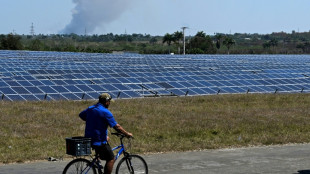
-
 Vital European defence startups still facing hurdles
Vital European defence startups still facing hurdles
-
'I don't have a voice in my head': Life with no inner monologue

-
 Pakistan chasing 265 to win shortened third New Zealand ODI
Pakistan chasing 265 to win shortened third New Zealand ODI
-
US soybeans, energy: Who is hit by China's tariff retaliation?
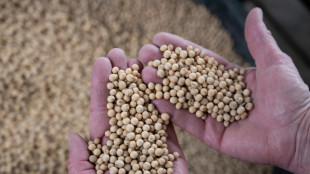
-
 Green, Sengun lift Rockets over Thunder, Celtics clinch record
Green, Sengun lift Rockets over Thunder, Celtics clinch record
-
Ariya downs defending champ Korda to advance at LPGA Match Play

-
 Ovechkin ties Gretzky's all-time record of 894 NHL goals
Ovechkin ties Gretzky's all-time record of 894 NHL goals
-
Under-pressure Doohan vows to learn from Japanese GP smash

-
 Harman goes four clear at Texas Open
Harman goes four clear at Texas Open
-
McLaughlin-Levrone, Thomas cruise to wins at opening Grand Slam Track

-
 Russian strike kills 18 in Ukrainian president's home city
Russian strike kills 18 in Ukrainian president's home city
-
US cardinal defrocked for sex abuse dies at 94
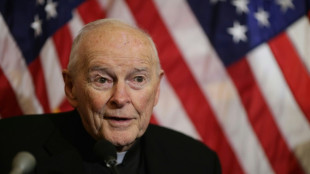
-
 Lula admits 'still a lot to do' for Indigenous Brazilians
Lula admits 'still a lot to do' for Indigenous Brazilians
-
England, Germany and Spain on mark in women's Nations League

-
 Bayern's Musiala to miss Inter first leg with injury
Bayern's Musiala to miss Inter first leg with injury
-
Judge orders return to US of Salvadoran man deported in error

-
 'Class' Freeman eases Northampton past Clermont and into Champions Cup quarters
'Class' Freeman eases Northampton past Clermont and into Champions Cup quarters
-
Amadou of Malian blind music duo dies aged 70

-
 Freeman hat-trick eases Northampton into Champions Cup quarters with Clermont win
Freeman hat-trick eases Northampton into Champions Cup quarters with Clermont win
-
Defiant Trump dismisses stock market's tariff plunge

-
 Musiala injury sours Bayern win at Augsburg
Musiala injury sours Bayern win at Augsburg
-
Peruvian schoolkids living in fear of extortion gangs

-
 Top seed Pegula rallies to oust defending champ Collins in Charleston
Top seed Pegula rallies to oust defending champ Collins in Charleston
-
Amadou of Malian blind music duo Amadou & Mariam dies aged 70

-
 California to defy Trump's tariffs to allay global trade fears
California to defy Trump's tariffs to allay global trade fears
-
Bayern's Musiala subbed off with injury days out from Inter clash

-
 Russian strike kills 16 in Ukraine leader's home city, children among dead
Russian strike kills 16 in Ukraine leader's home city, children among dead
-
NBA fines Grizzlies' Morant for imaginary gun gesture

-
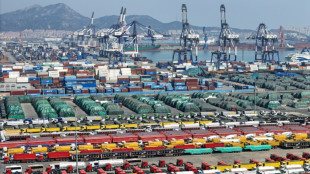 Trump tariffs offer opportunity for China
Trump tariffs offer opportunity for China
-
UK comedian Russell Brand charged with rape

-
 Marsh, Markram help Lucknow edge Mumbai in IPL
Marsh, Markram help Lucknow edge Mumbai in IPL
-
Trump gives TikTok extra 75 days to find buyer

-
 Israel attorney general accuses PM of 'conflict of interest' in security chief dismissal
Israel attorney general accuses PM of 'conflict of interest' in security chief dismissal
-
Emery glad to see Rashford make landmark appearance

-
 Sean 'Diddy' Combs faces more charges ahead of criminal trial
Sean 'Diddy' Combs faces more charges ahead of criminal trial
-
Russian missile strike kills 14 in Ukraine leader's home city

-
 Trump's tariff Big Bang puts global economy under threat
Trump's tariff Big Bang puts global economy under threat
-
I Am Maximus backed for National as Mullins hot streak continues

-
 2014 World Cup winner Hummels to retire at season's end
2014 World Cup winner Hummels to retire at season's end
-
Intercommunal violence kills dozens in central Nigeria
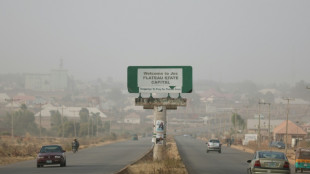
-
 Nigerian, S. African music saw 'extraordinary growth' in 2024: Spotify
Nigerian, S. African music saw 'extraordinary growth' in 2024: Spotify
-
Russell Brand: From Hollywood star to rape suspect

-
 France soccer star Mbappe unveiled in London... in waxwork form
France soccer star Mbappe unveiled in London... in waxwork form
-
Trump goads China as global trade war escalates

-
 Israel expands Gaza ground offensive, hits Hamas in Lebanon
Israel expands Gaza ground offensive, hits Hamas in Lebanon
-
TikTok faces new US deadline to ditch Chinese owner

-
 US Fed Chair warns tariffs will likely raise inflation, cool growth
US Fed Chair warns tariffs will likely raise inflation, cool growth
-
Mbappe among three Real Madrid players fined for 'indecent conduct'

-
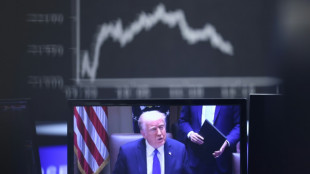 How can the EU respond to Trump tariffs?
How can the EU respond to Trump tariffs?
-
Canada loses jobs for first time in 3 years as US tariffs bite

| RBGPF | 100% | 69.02 | $ | |
| BCC | 0.85% | 95.44 | $ | |
| AZN | -7.98% | 68.46 | $ | |
| BTI | -5.17% | 39.86 | $ | |
| SCS | -0.56% | 10.68 | $ | |
| NGG | -5.25% | 65.93 | $ | |
| GSK | -6.79% | 36.53 | $ | |
| RELX | -6.81% | 48.16 | $ | |
| CMSC | 0.13% | 22.29 | $ | |
| JRI | -7.19% | 11.96 | $ | |
| RIO | -6.88% | 54.67 | $ | |
| BCE | 0.22% | 22.71 | $ | |
| BP | -10.43% | 28.38 | $ | |
| RYCEF | -18.79% | 8.25 | $ | |
| VOD | -10.24% | 8.5 | $ | |
| CMSD | 0.7% | 22.83 | $ |

The other greenhouse gases warming the planet
While carbon dioxide, or CO2, is the best known greenhouse gas, several others, including methane and nitrous oxide, are also driving global warming and altering the Earth's climate.
Atmospheric concentrations of all three hit new highs in 2023, locking in future temperature increases for years to come, the World Meteorological Organization reported in October.
- Methane -
CO2 accounts for about two-thirds of the warming attributed to greenhouse gases, said Piers Forster, an expert at the University of Leeds and author of reports by the IPCC, the UN's climate science panel.
Methane, or CH4, is the second most important greenhouse gas linked to human activity after CO2.
Around 40 percent of methane comes from natural sources, notably wetlands, but the majority (around 60 percent) is linked to human activities such as agriculture (ruminant breeding and rice cultivation), fossil fuels and waste.
Its warming power is more than 80 times greater over 20 years than that of CO2, but its lifespan is shorter, making it an important lever in attempts to limit global warming in the short term.
Reducing methane emissions "would have a strong short-term cooling effect, because atmospheric methane concentrations would drop quickly", said Mathijs Harmsen, a researcher at the PBL Netherlands Environmental Assessment Agency.
Policies should "focus on capturing the low hanging fruit, so the very low-cost measures such as reducing natural gas leaks", he said.
Despite a global commitment to reduce planet-heating emissions signed by many countries, including the European Union and the United States, the trend is not positive.
"Methane is rising faster in relative terms than any major greenhouse gas and is now 2.6-fold higher than in pre-industrial times," said an international group of researchers under the aegis of the Global Carbon Project, in a study published in the academic journal Environmental Research Letters.
- Nitrous oxide -
Nitrous oxide, or nitrous protoxide (N2O), is the third major greenhouse gas and almost 300 times more potent than CO2.
It is mainly emitted by synthetic nitrogen fertilisers and manure used in agriculture.
Other emissions come from human activities (the chemical industry, wastewater, fossil fuels) or natural sources (the soil and oceans).
"Global human-induced emissions, which are dominated by nitrogen additions to croplands, increased by 30 percent over the past four decades," concluded a major study in the journal Nature in 2020.
The key to the problem lies in more efficient use of fertilisers.
"Two-thirds of the climate change mitigation potential of N2O could be realised by reducing fertilisers on just 20 percent of the world's cropland, particularly in humid subtropical agricultural regions," wrote French researcher Philippe Ciais in 2021.
- Fluorinated gases -
Fluorinated greenhouse gases (PFCs, HFCs and SF6) are found in fridges, freezers, heat pumps, air conditioners and electrical networks.
Even when in small quantities, they stand out for their extremely high warming capacity.
For example, SF6, which is found in electrical transformers, has a greenhouse effect 24,000 times greater than CO2 over a 100-year period.
The Montreal Protocol signed in 1987, and ratified by 195 countries, has already significantly reduced the atmospheric presence of CFCs, another ozone-depleting fluorinated gas.
In 2016 the Kigali agreement also provided for the phasing out of HFCs.
And last year the EU sealed a pact to progressively ban the sale of equipment containing fluorinated gases, in particular HFCs, with the aim of eliminating them completely by 2050.
F.Pedersen--AMWN


